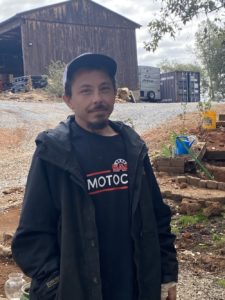 There are many ways people come to live without a home of their own. Some literally grow into it and have few options to find an off-ramp on the road to homelessness. Chris Smith moved to Tuolumne County with his family when he was three years old. His childhood home was never safe. Drugs, alcohol, violence, and abuse were a part of daily life for him and his three siblings.
There are many ways people come to live without a home of their own. Some literally grow into it and have few options to find an off-ramp on the road to homelessness. Chris Smith moved to Tuolumne County with his family when he was three years old. His childhood home was never safe. Drugs, alcohol, violence, and abuse were a part of daily life for him and his three siblings.
“I was the youngest and it seemed like it came down on me the hardest.” Chris says “At 11 years old, right after 9/11 I went into foster care. For the first three years, I was in a good home and I really liked being in foster care.”
“Then I was moved to a new home where I didn’t get along with my foster parents.” He continues “I started running away every weekend, getting in a lot of trouble and spent time in juvenile hall.”
Through his school years, sports were a release and distraction from his troubles. He turned into a star cross country runner in high school but it all changed in his junior year.
“Sports kept me in school but then I developed shin splints, it was very painful.” Chris explains “That ended my running career and I was really depressed. I turned to drugs at that point. I could handle the physical pain, but the emotional pain was too much.”
He dropped out of school, aged out of foster care, and started living on the streets.
“I became homeless the day I turned 18.” Chris says “I found a place near an abandoned house, the owner gave me permission to stay and I lasted there for a few years. It was hard to ask for help, I felt like I was accepting defeat and looking for pity if I did that.”
While living in a tent, Chris would find work and lose the position when an employer discovered he was homeless. He went through a series of jobs. “They don’t want you around when they find out you’re homeless.” Chris explains “I never looked like I was homeless, I knew where to clean up, get a shower and a meal. I didn’t really want any handouts, I needed a hand up but whenever someone found out I didn’t have a home they’d tell me I wasn’t working out or wasn’t a fit or that it didn’t look right for me to be there.”
While he was working for a short time at Mcdonald’s he met a young woman. They grew close, got a place together, and had a baby. Chris beams when talking about his daughter, Mia. “She’s the best thing that ever happened to me in my life.” He smiles “She’s my rock and anchor. When I found out I was going to be a father I cried tears of joy.”
Chris and Mia’s mom drifted apart. The hardest part of the breakup was not being able to see Mia on a regular basis. “We went our separate ways.” He says “It’s hard to keep up and get visits when you’re homeless. At one point I went nearly a year and only saw her 3 or 4 times. I didn’t feel it was fair. I wasn’t grungy and wouldn’t let her see me under the influence. I always had snacks and was ready for my visits. Now she’s back and I couldn’t be happier.”
They really enjoy their visits together here on the property. “She cries when she has to leave.” Chris says “I have to turn away but it’s hard.”
After 13 years of mostly living on the street or in cars, Chris came into shelter with Resiliency Village in January 2021 as part of the RoomKey program. At the time he was watching out for an elder, Steven who was living in his truck after suffering several strokes. I asked how he came to be in the position of caring for someone else at such a tough time in his life.
“It seemed like the right thing to do.” He responded “People were taking advantage of him after the strokes. We started to look out for each other.”
The unlikely pair came into RoomKey together and have continued their friendship as residents of Resiliency Village. Having a safe, secure place to call home has given Chris a chance to move forward in a way he didn’t think was possible living on the street.
“I’ve gained success I wouldn’t have been able to before.” He explains “I’ve been clean for almost a year, nearly finished the work for my high school diploma, enrolled in Columbia College and I have a job. I’m slowly getting to where I want to be. Slow progress is still progress.”
Chris has goals he’s working toward. “I want to get my own place.” He says, with a look of determination on his face “Finish my education, have my daughter back and continue with a career in foodservice. I enjoy cooking and eating!”
He is a testament to perseverance. He had no option except homelessness at the age of 18 when he aged out of foster care. He lived through some very difficult days but has righted his ship and has reason to look forward. “You have to keep pushing,” Chris advises. “Everyone has a story but you can’t give up. It will get better, just don’t quit.”
